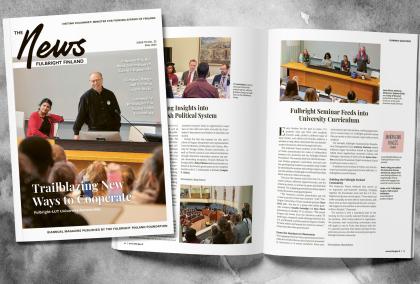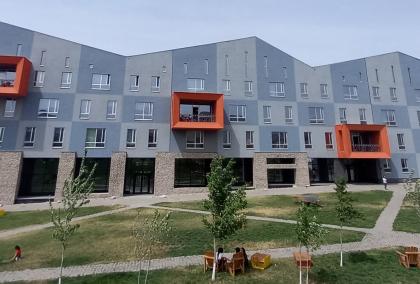Spouses, Domestic Partners and Children
There is no established program for spouses or partners in the Fulbright Program itself. However, the host universities have always been very willing to assist in finding suitable classes and courses. In some cases, host departments have been able to arrange teaching opportunities for spouses with an appropriate academic background. In such cases, however, a spouse may need to apply for a work permit and pay taxes in Finland.
It is a good idea to consider different options well in advance before departing from the United States. Spouses and partners are naturally welcome to attend all Fulbright Finland Foundation functions and events.
For me it has been joyful and rewarding to watch my child flourish with the independence that Finnish children have in their communities.
- U.S. Scholar Grantee 2014-2015
Young children have amazing amount independence. Don't be surprised if you see a 7 year old chatting it up on a cell phone while hopping on the metro.
- U.S. Student Grantee 2016-2017
A married partner of the grantee normally qualifies for a Finnish residence permit. A live-in-partner can also qualify for a Finnish residence permit, so long as you can prove that you have been living together for at least two years. For instance, a copy of a signed and shared apartment lease could work as proof.
If the grantee’s spouse also moves to Finland, the spouse is usually asked to present a marriage certificate at the Digital and Population Data Services Agency (The Finnish Digital Agency) in Finland. To do this, you should bring a marriage certificate with you from the U.S. to which a notary public has affixed the notary seal. You also need to have an apostille with the certificate (for the Finnish Digital Agency registration purposes) issued by the proper authority.
If a grantee’s children also move to Finland, the Finnish Digital Agency usually asks to see the children’s birth certificates when registering at the agency. Bring your children’s birth certificates along with you from the U.S., and be sure that the appropriate authorities have affixed a notary seal as well as an apostille.
If your family members have medical, educational, or other special needs that require particular support (e.g. doctors, clinicians, prescriptions, special education) or accommodations at work, school, or home, discuss this with the Foundation, as soon as possible. For example, check to see if needed medicines are available, or if not, what alternatives might work, as well. The Finland and U.S. medical and educational support systems can be different, especially for visitors, so knowing your options, and preparing well ahead of time, helps ensure a successful exchange for everyone.
Legalizing Documents - an Apostille Certificate
If you bring your family to Finland, the Finnish Immigration Service requires that the family-related documents you attach to the residence permit application are legalized by the issuance of an Apostille Certificate (e.g. marriage certificate and birth certificate).
If your spouse and children come with you, and should you choose to register with the Finnish Digital Agency, you will also need to bring your legalized marriage and children’s birth certificates with you.
In order for a document issued abroad by a foreign authority to have the intended legal effect in Finland, it must be legalized. Legalization takes place by two different means depending on whether or not the relevant country is a signatory to the Hague Convention of 1961. Documents supplied by countries that have ratified the Hague Convention are legalized by the issuance of an Apostille Certificate (stamp or paper certificate). The United States has ratified the Hague Convention. Documents issued by other countries are legalized through the Grand Legalization procedure.
Generally you can get the Apostille Certificate at the state Secretary of State’s Office. For detailed contact information, please visit the National Association of Secretaries of State.
A booklet on Apostille Certificate: ABCs of Apostilles - How to ensure that your public documents will be recognized abroad. Although the booklet states that the apostille can be issued in one day, some of our alumni have said that the total process took a long time for them, so please be prepared for the possibility of the process taking longer than expected.
Schools and Daycare for Your Children
If your children have medical or educational special needs that require particular support or accommodations at daycare, schools, or afternoon activities, you must discuss this well in advance (when applying for the spot) with the education or daycare providers of your host municipality. For example, if your child has dyslexia, make sure to include this information already in the school placement application. Kindly alert your Fulbright Finland Foundation program coordinator rather sooner than later if any issues arise. See the resources at the bottom of the page.
School
If you have school-aged children accompanying you to Finland, please begin the arrangements for their schooling in Finland immediately as sometimes aptitude tests are required and they may already take place in January/February. Also, contact your host if you need help with these arrangements.
Grantees with school-aged children may place them in local Finnish or Swedish-speaking public schools, or in public or private English or other foreign language schools. Please note that while the public schools run by the municipalities do not charge fees, private foreign language schools may charge tuition.
The application period for basic education (grades K-9) in English and bilingual education vary in different municipalities and sometimes by schools as well. Please follow the municipal sites and note the dates for the application periods as well as for the aptitude test that have to be taken for these programs.
Here are some links that may be useful when beginning the arrangements:
- Helsinki
- A small number of schools in Helsinki offer English/bilingual programs. Unfortunately, the reality in Helsinki is that sometimes students do have longer commutes to school, if they choose not to enroll in their local school. Above is a link (Helsinki) to a list of schools with English/bilingual programs and how and when to apply. Please note that to be admitted to these schools your children will need to submit an application during the application period and take an aptitude test when offered.
- Espoo
- Vantaa
- Tampere
- Turku
- Jyväskylä
- Kuopio
- Joensuu
- Oulu
Grantees who will spend the full academic year in Finland should not be afraid of placing their children in the Finnish or Swedish-speaking public schools. Children tend to learn languages surprisingly quickly, and on many occasions, the children of Fulbrighters have become fluent. Attending the local school is also a good way for your children to make friends with Finnish children living in the same area.
I strongly support the suggestion made by a Fulbright spouse to enroll school age children in a Finnish school. Any initial difficulties in mastering the language are more than compensated by the opportunity to be immersed in and share the Finnish culture and to get to know the people. It would be very easy to isolate oneself in work and the home. Having my children in Finnish environments provided the incentive to get to know people outside of the university and to get involved in other activities. This incentive gave the whole family the opportunity to experience Finnish life and truly enriched our time spent here.
- U.S. Scholar Grantee 2013-2014
In my opinion, Finland is incredibly friendly to students and families with small children. My son and I always felt safe, and I felt confident knowing that my son was learning a lot each and every day while attending his Finnish-language day care center. I couldn't be happier. -U.S. Student Grantee 2013-2014
The web is your first resource for information on schools in the city you will be living in. The Finnish National Board of Education and InfoFinland - Finland In Your Language are good places to start your search. They both provide links to familiarize you with the Finnish education system, and can point you in the right direction in terms of where to look for schools which suit your children’s needs.
Ask your academic hosts to identify the schools nearest to the location of your apartment and to assist you in securing a placement for your children. The cities' websites usually have the basic contact information for all schools in the area, with many of them offering links to the websites of the individual schools. Larger cities may also have special sections on education for foreigners on their website.
The Finnish community was very welcoming to my family. We completely appreciated how safe it is in Finland, and by the end of our stay our two girls (ages 12 and 9) were even taking the city buses to school and back by themselves. -U.S. Scholar Grantee 2013-2014
Contact the principal (rehtori) of the school you are considering for your children. The principal makes the decision to admit a child to the school, and you should contact the school in order to address all of the logistical tasks as early as possible.
It may be useful to bring some of the textbooks your children would have been using back home, as the teachers in Finland will appreciate information about the level and material your child is expected to work with upon returning to the United States. Ask the Finnish school for additional instructions on what to bring and how to prepare your child.
Finnish public schools are uniformly of high quality. There is, however, relatively little extracurricular activity, and children’s free-time activities are often quite separate from those during the school day. Some Finnish day care centers accept foreign children, and there are also English language day care centers for children between four and seven years of age. The day care centers can be located on the city's website, usually under sections "For Families", "Services", or "Social Services".
Finnish schools have zero tolerance for bullying. In case your child experiences any kind of bullying, report the incident immediately to the classroom teacher, principal, and the international programs coordinator, in order to enable the school to resolve the situation. It is also important to notify your program coordinator about the issues, so that they can reach out to the school as well if needed.
School Calendar
The public school (K-12) year usually runs from mid-August to the end of May or early June, with 190 days of attendance over a five-day week, and a four- to seven-hour school day. During first and second grades the school week is approximately 20 hours and the school day usually ends between 12 pm and 2 pm. The class schedule varies from day to day, but the weekly schedule typically stays the same. Organizing after-school activities are the guardians responsibility. Many schools offer supervised after-school activities, so contact the school about these opportunities as soon as you know that you are coming to Finland.
It was hard to find after-school activities in English, but we did! And loved our theater program in English. Luckily, in a break-out room in the orientation, someone mentioned to look into the Youth Houses/Nuorisotalo. - U.S. Grantee 2021-2022
The school system in Finland is considered one of the best in the world, with that said, though, it is completely different from the U.S. The Finnish kids start school older, but they also do not go to school at 8:30 - 3:00 Monday - Friday. Each grade has its own schedule with regards to when school starts and ends. -U.S. Scholar Grantee 2013-2014
There is slight variation in the school calendar between different cities and schools. If you plan on placing your children in Finnish schools, you should arrive in Finland before mid-August. Generally, the school year has two terms, with a two-week holiday at Christmas. There is also a vacation week at Easter, and another in February or March for winter vacation. Additionally, some schools have a vacation week during the fall. Daycare centers operate throughout the year, but are closed for public holidays and the summer holiday season.
If you have children in music lessons, those are not organized in the school (as in the U.S.) and need to be arranged separately with a music school.
Daycare
Ask your academic hosts to assist you in finding daycare for your children. Note that both nursery and elementary schools may be in session for half-days only. Therefore, school is not necessarily a substitute for daycare if both parents are working. Daycare placement should be applied as early as 4 months before the indented starting date to better guarantee a placement close to your home or a specific daycare.
The general rule is that if you have a municipality of residence in Finland (kotikunta), you can apply for municipal daycare for your child. Please see further information on municipal daycare at the InfoFinland website.
Daycare for children less than a year old is difficult to find, as Finnish maternity and paternity leaves normally allow one parent to be at home during the infant’s first year. Many communities have apartment blocks with a small common park where children can be looked after for a few hours a day by a puistotäti (park babysitter). In most cities, there are good public libraries with children’s book and video collections (ask for those in English).
Short-term child care can be found, for example, through these two organizations:
- Väestöliitto – the Family Federation. The page is only in Finnish, but you can call them at +358 20 799 5656. They do regular child care, care for sick children, do housework etc.
- Mannerheimin lastensuojeluliitto - The Mannerheim League for Child Welfare. They offer help with child care. The League’s child care services are meant to meet temporary and short term needs for child care assistance. Their services are available around the clock and also on weekends.


